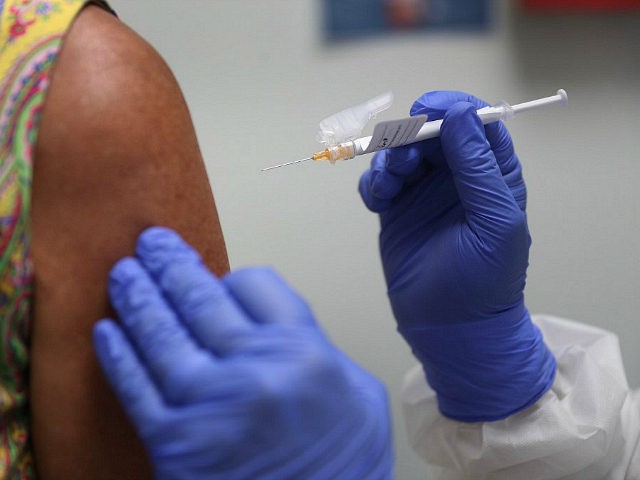China’s state-run Global Times on Thursday trumpeted results of a Phase III clinical trial on Sinopharm’s coronavirus vaccines, published by the Journal of the American Medical Association (JAMA), that found the Chinese company’s two leading products were over 70 percent effective.
Those ratings are far beneath the effectiveness of top Western vaccines, and incongruous with the coronavirus surges experienced recently by countries that rely heavily on Chinese vaccines.
The Global Times quoted JAMA saying the Sinopharm vaccine developed in Beijing is 78.1 percent effective in short-term studies, while the vaccine developed in Wuhan, the epicenter of the Chinese coronavirus pandemic, was 72.8 percent effective. The trial of 40,382 participants produced 26 “symptomatic cases of Covid-19 [Chinese coronavirus]” and “light adverse reactions” in a little under half of the patients, but no “severe cases” of the coronavirus.
Both vaccines use the older inactive-virus method of inoculation, rather than the newer mRNA technology favored by companies like Pfizer that teaches the patients’ bodies to manufacture the necessary antibodies without actually introducing virus cells into their systems.
By comparison, Pfizer’s vaccine is rated 95 percent effective, Moderna is 94 percent, and the U.K.’s AstraZeneca was found to be 76-85 percent effective in different tests, and Johnson & Johnson’s vaccine was rated as 72 percent effective. The latter two are not mRNA technology vaccines.
“The vaccines developed by Sinopharm’s Beijing institute has been approved by the World Health Organization (W.H.O.) for emergency use. The group’s two vaccines have been approved for emergency use by more than 70 countries, regions, and organizations,” the Global Times noted.
Nature noted in May that China was eager to obtain W.H.O. approval for its vaccines, beginning with Sinopharm’s products, and W.H.O.’s COVAX program for distributing vaccines to poorer nations is desperate for more shots, especially as supplies from India’s massive pharmaceutical industry were halted because the medicines were needed to cope with India’s coronavirus surge. COVAX wanted to ship two billion doses by the end of 2021 but has been able to provide only about 50 million as of May.
However, questions remain about the safety and effectiveness of China’s vaccines. There are fears the Communist country’s predilection for secrecy will increase the “vaccine hesitancy” that has already stymied many vaccination rollouts in the developing world.
As Nature pointed out, W.H.O. requires only 50 percent effectiveness for emergency approval – a low threshold applauded by virologists eager to administer as many shots as possible and worried about supply problems, but they might have underestimated the vaccine hesitancy issue, and how much worse it could become if low-effectiveness shots are administered to skeptical populations.
Seychelles, the “world’s most vaccinated nation,” has been experiencing a troubling surge of coronavirus cases despite heavy deployment of Sinopharm vaccines. The New York Times in May delicately described the Seychelles surge as a “setback” for the other 56 countries relying on Chinese medicines. Virologists called the news from Seychelles “alarming” and said the results suggest Sinopharm’s product might be closer to, or even below, the 50 percent effectiveness limit than clinical trials touted by China suggested.
Bahrain, which also relied on Sinopharm for its vaccination campaign, is also having a coronavirus surge. Officials in Bahrain and the United Arab Emirates (UAE) last week began offering a third injection – billed as an “additional supportive dose of Sinopharm” – to patients who have already received two doses of the Chinese medicine as new infections hit record levels despite widespread inoculation.
The people of the Philippines are exceptionally reluctant to accept Chinese vaccines, with some reportedly getting cold feet and ducking out of appointments just as they were set to receive shots from China.
“Whether you are a millionaire or a pauper, you get what is given to you. You can’t choose,” irascible Philippine President Rodrigo Duterte snarled at his citizens last week after they swarmed a clinic in metropolitan Manila that was rumored to be distributing Pfizer shots instead of Chinese vaccine.
The Taiwanese government on Monday flatly refused Beijing’s very aggressive efforts to push Chinese vaccines upon the island, expressing its distrust for the Chinese products and complaining China is obstructing Taiwan’s efforts to obtain better shots from Western providers.

COMMENTS
Please let us know if you're having issues with commenting.